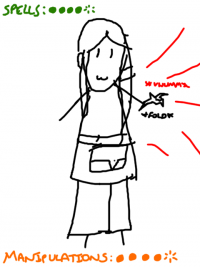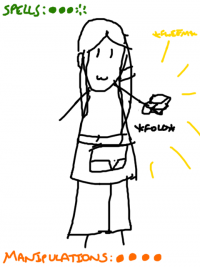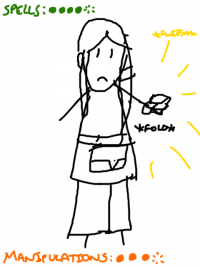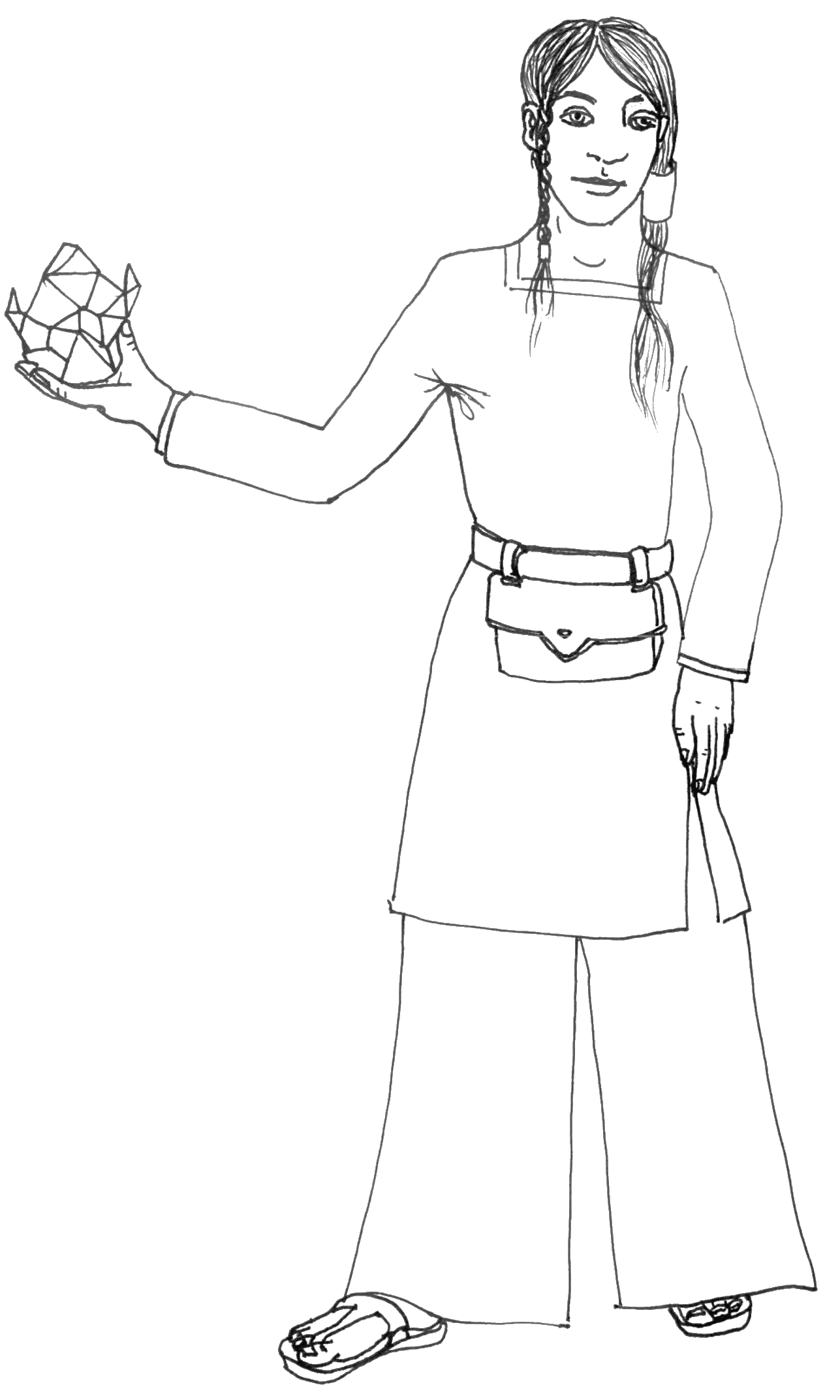Sidebar
Table of Contents
Class Introduction: Mages
Depending on what you want to get out of playing a character, a Mage may be a worthwhile consideration. There are a variety of different magics to choose from, each with its own style and implications, but Mages are generally a consistent affair with a particular action done whenever you need to cast a spell.
The types of magic are:
- Space - Twisting space to distort and rearrange the positions of things. A mixed offensive/support magic with a variety of ranged calls and effects mostly focusing on DRAW and PUSH.
- Identity - Affirming one's identity upon the world by displaying the traits one claims to have. A magic mainly focused around self-buffing, at the cost of not being able to benefit from support effects from others.
- Uncertainty - Creation of possibilities and random chance. A risky magic full of large area of effect spells, but casting requires removing focus from a surrounding battle, and so difficult to specifically target against friend or foe.
- Life - Restoring people to health or shielding them from things which would harm them. A mostly supportive magic which provides buffs and healing.
- Body - Working of the bodies one forms whilst on a Vision Quest. Another mostly supportive magic which is substantially better on Vision Quests than it is in the physical plane, where some of the effects can be brought through with effort but to a limited extent. This makes Body Mages more complicated than other types, as their spells have two variants to remember, although the differences are fairly consistent (standard duration in physical, or no longer ARC).
Resource: Manipulation
 1. Mages use Manipulations to twist reality in various ways, also known as casting spells. The Mage shown here is a Space Mage, so they fold paper in intricate ways to cast magic. Though for phys-repping purposes, you just need to fold a single sheet of paper several times. If you're not in the middle of a Manipulation, you can start a new one at any time to start casting, which then gives you a number of spells you can cast under it. Initially, this is 5, and the Manipulation will last until you cast that many spells or the encounter ends.
1. Mages use Manipulations to twist reality in various ways, also known as casting spells. The Mage shown here is a Space Mage, so they fold paper in intricate ways to cast magic. Though for phys-repping purposes, you just need to fold a single sheet of paper several times. If you're not in the middle of a Manipulation, you can start a new one at any time to start casting, which then gives you a number of spells you can cast under it. Initially, this is 5, and the Manipulation will last until you cast that many spells or the encounter ends.
 2. These spells all have to be different! So here, our Mage is using a different spell under the same Manipulation, and that's all good. The casting method is the same, but the effect is different.
2. These spells all have to be different! So here, our Mage is using a different spell under the same Manipulation, and that's all good. The casting method is the same, but the effect is different.
 3. Beware, if you want to cast the same spell more than once, you need to start a new Manipulation, which ends your previous Manipulation early if you still have spell uses left! It may be that you actually don't have enough different spells to use up all of the slots in your Manipulations, which at lower levels is fine and expected, but once you have more spells available, you might want to consider getting more spells in this situation. To make the most efficient use of your Manipulations, you need to use a variety of spells instead of just spamming the same one over and over.
3. Beware, if you want to cast the same spell more than once, you need to start a new Manipulation, which ends your previous Manipulation early if you still have spell uses left! It may be that you actually don't have enough different spells to use up all of the slots in your Manipulations, which at lower levels is fine and expected, but once you have more spells available, you might want to consider getting more spells in this situation. To make the most efficient use of your Manipulations, you need to use a variety of spells instead of just spamming the same one over and over.
Low Level
At low level, a Mage has a limited number of spells, and so there isn't too much to remember. You won't genenrally have enough spells to use up all of your casts per Manipulation, but this makes things easier as you can just play out each Manipulation by casting each spell you know once, and repeat.
High Level
At high level, a Mage may have a familiar to worry about, but the main focus will typically be on having a wider range of spells to remember. Knowing which spells to use and when to make the most effecient use of your Manipulations will be the key here.
Example Starting Builds
Some possible basic builds for Mages follow:
Space
- Combat Proficiency (Free)
- Use Weapon
- Weapon Skill 1
- Rank C Spellcaster: Flash Crush
- Rank B Spellcaster: Spatial Projection
- Fast Casting
This starting build is a fairly offensive one - it gives you your chosen weapon, but also the ability to make its calls at range by using Spatial Projection. Flash Crush provides some serious ranged damage to go with that, and Fast Casting allows you to do one of these quickly off the bat.
Identity
- Combat Proficiency (Free)
- Rank C Spellcaster: Ignore the World
- Additional Rank C Spell: Personal Space
- Rank B Spellcaster: Personal Conviction
- Medium Armour 1
- Mental Fortitude
This starting build, in contrast to the above, is very defensive. Whilst the magic will allow for more offensive calls as you have more XP available to spend on more spells, this build initially focuses on survivability with the ability to charge into battle with a large buffer of temporary hits and temporary immunity to particular impairments before pulling out, and some resistance and some armour for extra hits for good measure. Spells give access to some calls of PUSH for the encounter which are useful to take the heat off.
Uncertainty
- Combat Proficiency (Free)
- Rank C Spellcaster: Mental Uncertainty
- Additional Rank C Spell: Missing Strength
- Rank B Spellcaster: Unseen Strength
- Fast Casting
- Light Armour 1
This starting build attempts to minimise some of the risks involved in casting Uncertainty magic. With Fast Casting you can insta-cast Unseen Strength to kick off the fight before foes are in range to be quite sure that they won't be caught in its effect. Using Missing Strength when this BUFF is about to expire will then have minimal effect on any party members caught in the area of effect whilst having maximum effect on your opponents. With these mental effects then out of the way, you can tactically use Mental Uncertainty to give your side an advantage if they're using any mental calls whilst yours is focusing on the physical.
Life
- Combat Proficiency (Free)
- Rank C Spellcaster: Life Pulse
- Rank B Spellcaster: Draw on Life
- Fast Casting
- Use Weapon
- Weapon Skill 1
This starting build balances some weapon skills with Life magic spells - whilst it would be possible to go for a full support-type build, at starting level the available spells are limited in when they are useful, and it would be easy to end up with a build where you can keep several people alive in dire circumstances but have little to do most of the rest of the time. Instead, this build allows you to contribute to the fight more readily, and then when the going gets tough immediately pick up downed allies by fast-casting Life Pulse. If no others are down, you can then still use Draw on Life to then bolster a standing ally with a heal.
Body
- Combat Proficiency (Free)
- Rank C Spellcaster: Keen Edge
- Additional Rank C Spell: Enfeeble
- Rank B Spellcaster: Sustain Body
- Weapon Use
- Detailed Knowledge 1
This starting build takes a mixed but fairly Vision Quest-centric approach. In addition to the considerable power Body spells have in Vision Quests, Detailed Knowledge provides an extra Spirit hit (and knowledge of a topic of your choice). Whilst Body spells do have an effect in the physical plane, they're much less efficacious, so you at least get your choice of weapon type to avoid being too disadvantaged there.
Create a Mage
Ready to try creating a Mage? The full description along with class skill tree and descriptions can be found here - you get Combat Proficiency from the Weapon Skills tree for free, and you'll need to pick 5 other level 1 skills (plus more for any additional XP you're adding) from these sets of skills:
The lists of spell effects for different types of Mage can be found here, bearing in mind that at level 1 you can get all Rank C spells but only a single Rank B spell:
Suggested skills for Mages vary according to the type of Mage, but generally Space and Body Mages can be built how you'd like. It's suggested that you balance a Life Mage with Weapon Skills as otherwise there may be times when there isn't as much you can contribute, and as an Identity Mage you may want some Weapon Skills to provide a baseline of combat ability which you can bolster with your spells. Uncertainty magic is more tactical but harder to use, so isn't recommended as a first choice, but if you want to go for it then build with a focus on Weapon/General Skills or Class skills depending on how risky you want to play.
Armed with this information, you can then complete the remaining steps of Character Creation.


